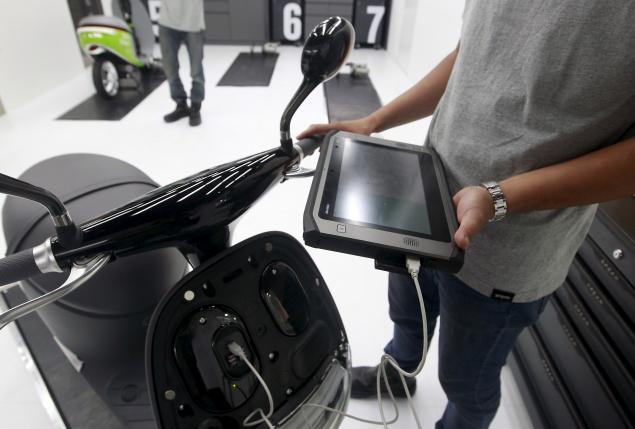Taiwan courts tech start-ups to drive economic growth

TAIPEI - Companies such as electric motor scooter firm Gogoro could hold the key to Taiwan's economic growth.
In just three years, the start-up, which counts Japan's Panasonic Corp as a strategic partner and Cher Wang, the founder of local smartphone maker HTC Corp as a key investor, raised $150 million to develop the smartphone-synched bike, and a charging network for it. The Smartscooters went on sale last month, starting at around $4,100.
Gogoro's success in creating a home-grown, innovative product is precisely what Taiwan's government wants to foster as it seeks to reduce the export-driven economy's reliance on the island's world-class tech manufacturing sector.
These tech firms, which include HTC, the world's biggest contract chip maker Taiwan Semiconductor Manufacturing Co Ltd and iPhone maker Hon Hai Precision Industry Co Ltd, also give Taiwan an advantage over the many other countries seeking to nurture tech start-ups.
"We hope our policies can help a start-up at its most difficult stage - the beginning - so it can go the way of Gogoro," said Jan Fang-guan, an official with the government planning agency, the National Development Council (NDC).
Tech manufacturing accounts for a third of all Taiwan's industrial output, but two years ago, the NDC recognized growth in this sector was plateauing as firms lose out to cheaper, Chinese rivals.
In June, exports shrank by the most in more than two years - and for the fifth consecutive month - as shipments of tech goods and demand from major trading partner China fell sharply.
In a bid to stabilize trade and make the economy more "creativity intensive", the NDC a year ago set up HeadStart, a project dedicated to creating a local Silicon Valley by relaxing regulations for registering start-ups, matching funds invested into projects and creating tech hubs.
HeadStart has attracted some T$13.6 billion ($438 million) in funds so far this year, Jan said.
Cjin Cheng, who manages Taiwan for U.S.-based start-up fund 500 Startups, said the island's established tech scene and global connections would help entrepreneurs, in contrast to rivals in China, where Internet access is largely restricted.
"You can build out easily if you want to," she said.
An educated and young population also work in Taiwan's favor: during a visit in March, Jack Ma, the founder of Chinese e-commerce giant Alibaba Group Holding, said he wanted to set up a T$10 billion fund to support Taiwanese entrepreneurs, rankling the authorities as political ties with China remain uneasy.
Taiwan's big tech firms make it fertile ground for tech start-ups, said John Fan, who co-founded PicCollage, the most downloaded app from Taiwan.
He said many entrepreneurs create a start-up, work for a big company for a while when their business is acquired, and then leave to set up on their own again. "They are always thinking about the next thing. That's the default lunchtime conversation," said Fan, who previously worked at Qualcomm.
HTC, once one of the world's biggest smartphone makers, also inadvertently gave the local start-up scene a boost: it hired several entrepreneurs during its heyday, but many have since left to set up on their own as HTC lost its competitive edge.
Gogoro's co-founders Horace Luke and Matt Taylor are former HTC executives. John Wang, who left HTC in 2012 after creating the firm's "Quietly Brilliant" marketing slogan, has also set up his own firm, which is preparing to launch a smartwatch.
"You've got to be able to reinvent the business model," said Wang. - REUTERS







